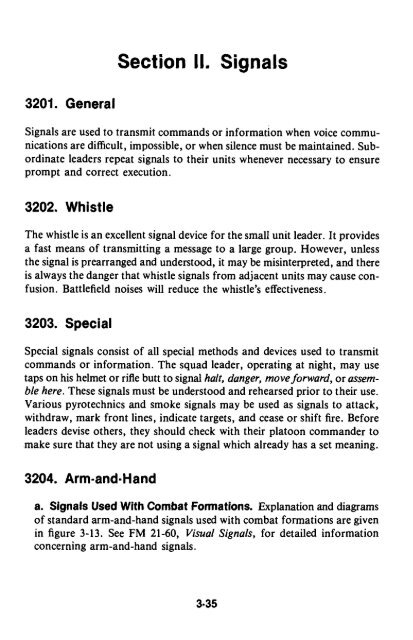- Page 1 and 2:
MCWP 3-11.2 w/Ch 1 Marine Rifle Squ
- Page 3 and 4:
1. PURPOSE DEPARTMENT OF THE NAVY H
- Page 5 and 6:
User Suggestion Fonn From: To: Comm
- Page 7:
Record of Changes Change No. Date o
- Page 10 and 11:
vUi Section IV. M203 Grenade Launch
- Page 12 and 13:
x 4504 Preparatory Phase for the Ni
- Page 14 and 15:
xii 8305 Security 8-21 8306 Movemen
- Page 16 and 17:
xiv Appendixes: Index A Military Sy
- Page 18 and 19:
1.2 SGT ®®ØO ®®ØO L!CPL L!CPL
- Page 20 and 21:
1.4 (f) Cartridge, 40 mm, multiple
- Page 22 and 23:
1-6 1006. Fire Support for the Squa
- Page 24 and 25:
2.2 Section II. Range Determination
- Page 26 and 27:
2-4 2203. Five-Degree Method Iftime
- Page 28 and 29:
2-6 Section III. Rifle and Automati
- Page 30 and 31:
2-8 caused by slight variations in
- Page 32 and 33:
2.10 (3) Enfilade Fire. Fire delive
- Page 34 and 35:
2-12 b. Sustained Rate. This term a
- Page 36 and 37:
2.14 positions are prepared which p
- Page 38 and 39:
2.16 Although the pointing techniqu
- Page 40 and 41:
2-18 BLUFF OR HORIZON OR SKYLINE Fi
- Page 42 and 43: 2-20 c. Reference Points (1) To hel
- Page 44 and 45: 2.22 b. The squad leader also uses
- Page 46 and 47: 2.24 b. In this example, the squad
- Page 48 and 49: 2.26 Section VI. Application of Fir
- Page 50 and 51: 2.28 ___ ___I 302 202 102 Figure 2.
- Page 52 and 53: 2.30 . .'.' S ___ ___I 302 202 0d2
- Page 54 and 55: 2.32 (a) Riflemen and Assistant Aut
- Page 56 and 57: 2.34 RIFLE LEFT LIMIT STAKE RIGHT L
- Page 59 and 60: Chapter 3 Combat Formations and Sig
- Page 61 and 62: NOTE: THE POSITION OF THE FIRE TEAM
- Page 63 and 64: ECHELON LEFT ECHELON RIGHT Figure 3
- Page 65 and 66: (d) Vulnerable to fire from the fro
- Page 67 and 68: 0 0 0 0 00 ' ' "___________ ' 302 1
- Page 69 and 70: 0 0 --- - 102 0 0 '-_________ 202 0
- Page 71 and 72: BATTLE DRILL FIRE TEAM FORMATIONS C
- Page 73 and 74: COLUMN TO SKIRMISHERS LEFT Figure 3
- Page 75 and 76: COLUMN TO ECHELON LEFT Figure 312 e
- Page 77 and 78: SKIRMISHERS RIGHT WEDGE TO SKIRMISH
- Page 79 and 80: WEDGE TO ECHELON RIGHT Figure 3-12
- Page 81 and 82: SKIRMISHERS RIGHT To COLUMN Figure
- Page 83 and 84: WEDGE SKtRMISHERS RfGHT TO WEDGE Fi
- Page 85 and 86: SKIRMISHERS RIGHT TO ECHELON RIGHT
- Page 87 and 88: ECHELON RIGHT TO COLUMN Figure 3.12
- Page 89 and 90: ECHELON LEFT TO WEDGE Figure 3.12 s
- Page 91: ECHELON LEFT TO SKIRMISHERS LEFT Fi
- Page 95 and 96: j I 2 Figure 3-13. Arm-and-Hand Sig
- Page 97 and 98: 11T- \\ .—,' Figure 3.13. Arm•a
- Page 99 and 100: 14 15 _ÔB. 16 17 t 4 18 19 Figure
- Page 101 and 102: _____ p I. 'a-- - — I- Figure 3-1
- Page 103 and 104: 26 27 : : '\ Figure 3-13. Arm-and-H
- Page 105 and 106: 32 33 34 35 36 37 Figure 3-13. Arm-
- Page 107 and 108: Figure 3-14. Arm-and-Hand Signals.
- Page 109: Figure 3.14. Arm-and.Hand Signals.
- Page 112 and 113: 4.2 Section II. Preparation Phase 4
- Page 114 and 115: 4.4 (a) Flank Connecting Files or G
- Page 116 and 117: 4-6 (C) The squad leader assigns ea
- Page 118 and 119: 48 (e) The point engages all enemy
- Page 120 and 121: 4-10 I / r DIRECTION OF MOVEMENT Fi
- Page 122 and 123: 4.12 (C) The squad is often detaile
- Page 124 and 125: 4.14 b. Troop Leading Procedures. T
- Page 126 and 127: 4-16 (b) Location of the Commander.
- Page 128 and 129: 4-18 Figure 4-9. Rifle Platoon from
- Page 130 and 131: 4-20 (c) When a scouting fire team
- Page 132 and 133: 4-22 c. Squad Employment. The squad
- Page 134 and 135: 4.24 (1) Single Envelopment. A squa
- Page 136 and 137: 4-26 (2) The amount of time the ass
- Page 138 and 139: 4-28 coordination line in order to
- Page 140 and 141: 43O 4305. Consolidation a. General.
- Page 142 and 143:
4•32 4306. Reorganization Once th
- Page 144 and 145:
4501. General 4.34 Section V. Night
- Page 146 and 147:
4-36 d. Release Point. Release poin
- Page 148 and 149:
4-38 (6) On order, the squad moves
- Page 150 and 151:
4.40 and secured for silent movemen
- Page 152 and 153:
4.42 4603. Conduct of the Attack by
- Page 154 and 155:
5.2 5103. Definitions a. Sector of
- Page 156 and 157:
5.4 to surprise the defender by con
- Page 158 and 159:
5.6 This terrain feature may be the
- Page 160 and 161:
5-8 1. Mutua' Support. Units and su
- Page 162 and 163:
5-10 b. Fire Plan. The fire team le
- Page 164 and 165:
5.12 (7) M.203 Employment (a) In as
- Page 166 and 167:
5-14 FORWARD EDGE SIDE UNIT SYMBOL
- Page 168 and 169:
5.16 Figure 5.9. Squad Fire Plan. (
- Page 170 and 171:
5.18 Section H. Defensive Procedure
- Page 172 and 173:
5-20 b. Signal to Commence Final Pr
- Page 174 and 175:
522 Figure 5.11. Clearing Fields of
- Page 176 and 177:
5.24 GROUND LINE' .. .1 -'p1" - VAR
- Page 178 and 179:
5-26 (c) Fighting Hole With Camoufl
- Page 180 and 181:
5.28 (6) Replace natural material u
- Page 182 and 183:
5-30 "Open fire on the enemy when t
- Page 184 and 185:
5-32 5207. Defense Against Mechaniz
- Page 186 and 187:
5-34 (1) A screen is a security ele
- Page 189 and 190:
Chapter 6 Amphibious Operations 600
- Page 191 and 192:
6004. Debarkation Debarkation is ch
- Page 193 and 194:
(5) Boat Paddle Handler. One member
- Page 195 and 196:
g. AAV Boat Team. Organization and
- Page 197 and 198:
Chapter 7 Helicopterborne Operation
- Page 199 and 200:
a. Heliteam Organization. Heliteams
- Page 201 and 202:
(4) Personnel enter the aircraft ca
- Page 203 and 204:
Chapter 8 Patrolling Section I. Pat
- Page 205 and 206:
d. The patrol leader may divide the
- Page 207 and 208:
. Provide Required Personnel and Eq
- Page 209 and 210:
8205. Plan Use of Time In order for
- Page 211 and 212:
(2) En Route. This is the equipment
- Page 213 and 214:
d. Specific Instructions (1) To Sub
- Page 215 and 216:
and/or consultation with others who
- Page 217 and 218:
1. SITUATION a. Environment. Weathe
- Page 219 and 220:
(3) If there is any time between th
- Page 221 and 222:
leader, usually accompanied by a ra
- Page 223 and 224:
who starts the count. The last man
- Page 225 and 226:
c. Halts. The patrol leader halts t
- Page 227 and 228:
8307. Actions at Danger Areas A dan
- Page 229 and 230:
aircraft shouts, "Aircraft, front (
- Page 231 and 232:
(b) Men not in the killing zone man
- Page 233 and 234:
contamination, terrain, and enemy f
- Page 235 and 236:
then reconnoiters the objective (ro
- Page 237 and 238:
the mission, enemy situation, troop
- Page 239 and 240:
(1) The primary purpose of ambushes
- Page 241 and 242:
weapons and machine guns are positi
- Page 243 and 244:
(3) When the patrol's primary purpo
- Page 245 and 246:
Section VI. Information and Reports
- Page 247:
PATROL REPORT (OMIT HEADING(S) NOT
- Page 250 and 251:
9-2 Urbanization is characterized b
- Page 252 and 253:
9.4 STEEL (Heavy Cladding) CONCRETE
- Page 254 and 255:
9.6 9104. Phases of Attacking a Bui
- Page 256 and 257:
9-8 b. A squad attacking in a built
- Page 258 and 259:
9.10 (2) When moving on stairs, tak
- Page 260 and 261:
9.12 (2) The HEDP round can be used
- Page 262 and 263:
9.14 e. Mines and obstacles are use
- Page 264 and 265:
9.16 (g) Barbed wire and other obst
- Page 266 and 267:
9.18 (5) Once the assault unit has
- Page 268 and 269:
9-20 is desired, to open fire upon
- Page 270 and 271:
9.22 e. Movement to the Assault Pos
- Page 272 and 273:
9-24 (4) Shock Action. Firepower, a
- Page 274 and 275:
9.26 THIS NOT THIS A NOT THIS THIS
- Page 276 and 277:
CHANGE 1 9-28 Section IV. Mine Warf
- Page 278 and 279:
9-30 (3) FASCAM (family of scattera
- Page 280 and 281:
9.32 b. Characteristics of Military
- Page 282 and 283:
9.34 Section V. Nuclear and Chemica
- Page 284 and 285:
9-36 (3) Subsurface Burst. A subsur
- Page 286 and 287:
9.38 a damp cloth to prevent inhala
- Page 288 and 289:
94O b. Detection of Chemical Agents
- Page 290 and 291:
9.42 (b) Water may be used to flush
- Page 292 and 293:
9.44 a. SeUDiscipIine. An important
- Page 294 and 295:
9•46 (2) Occupation of a Patrol B
- Page 296 and 297:
9-48 • Establishing restricted ar
- Page 298 and 299:
9-50 • Location of the house and
- Page 300 and 301:
A.2 lcD I Armor I • I Artillery 1
- Page 302 and 303:
A-4 7. Weapons Symbols. Followingar
- Page 305 and 306:
Appendix B Method of Challenging by
- Page 307 and 308:
Appendix C Troop Leading Procedures
- Page 309 and 310:
Appendix D Estimate of the Situatio
- Page 311:
(5) Avenues of Approach. An avenue
- Page 314 and 315:
E-2 b. Subordinate Tasks (Missions)
- Page 316 and 317:
F•2 onethousand two, and so forth
- Page 319 and 320:
Appendix H Cover, Concealment, and
- Page 321 and 322:
3. Concealment is anything that hid
- Page 323 and 324:
Figure H•5. Shadows. c. Fightingp
- Page 325 and 326:
f. Contrasting colors are more easi
- Page 327 and 328:
AIR VIEW ..i/ POSITIONS MUST LOOK L
- Page 329 and 330:
Figure H-li. Foliage. s— — __ F
- Page 331 and 332:
Appendix I Glossary Acronyms AAV AD
- Page 333:
Appendix J References 1. Fleet Mari
- Page 336 and 337:
ndex-2 Assistant boat team commande
- Page 338 and 339:
Index-4 Combat formations —Contin
- Page 340 and 341:
Index-6 Duties.1005 1-4 Assistant a
- Page 342 and 343:
Index-8 Fire plan —Continued Sket
- Page 344 and 345:
Index-lO Landmines .9401c Leading t
- Page 346 and 347:
Index.12 Offensive combat — Conti
- Page 348 and 349:
Index.1 4 Planof defense .5202 5-18
- Page 350 and 351:
Index.1 6 Tank-infantry tactics: Ac




